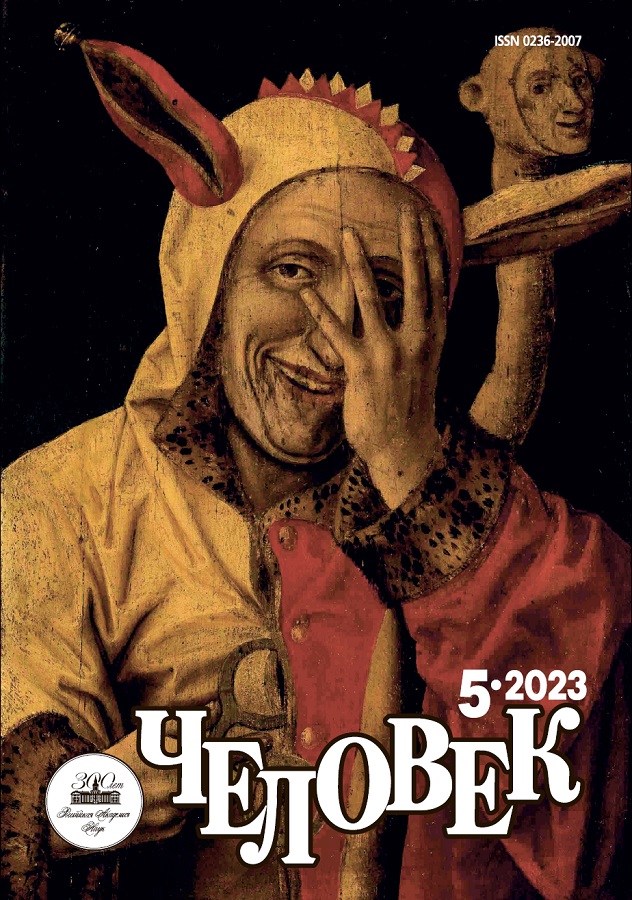Soviet Marxist Humanism: from the Class Struggle to the Renaissance of Human
- Autores: Emelyanov A.S.1
-
Afiliações:
- Kursk State University
- Edição: Volume 34, Nº 5 (2023)
- Páginas: 114-129
- Seção: Symbols. Values. Ideals.
- URL: https://freezetech.ru/0236-2007/article/view/670658
- DOI: https://doi.org/10.31857/S023620070028505-2
- ID: 670658
Citar
Texto integral
Resumo
The article considers the main ideas of Soviet Marxist humanism. It is shown that, despite ideological control over culture and science, an original version of Marxist humanism has been developing in Soviet philosophy since the mid 1930-s. Unlike other countries, where the publication of Marx's Economic and Philosophic Manuscripts played a key role in the emergence of Marxist humanism, this publication did not have the same impact in the USSR. Soviet Marxist humanism results from the debates about proletarian culture and humanism in 1920–30-s and also evolves as an anti-fascist movement. Studying the subject, we analyze three key narratives: proletarian humanism, socialist humanism and communist humanism. Proletarian humanism (M. Gorky, M. Petrosyan), in our opinion, historically corresponded to the period of irreconcilable ideological struggle with abstract humanism and fascism. Socialist humanism (N. Bukharin, P. Fedoseev, F. Konstantinov) was investigating necessary material and spiritual conditions to bring up a comprehensively developed personality. Communist humanism (I. Frolov) reflected the process of scientific and technological revolution and historically corresponded to de-escalation of international relationships and political course towards democratization and transparency.
Sobre autores
Andrei Emelyanov
Kursk State University
ORCID ID: 0000-0002-1455-3437
33 Radishcheva str., Kursk 305000, Russian Federation
Bibliografia
- Алымов С. О личностях и элементалах: позднесоветская социальная философия от марксистского гуманизма к идее Homo sovieticus // Антропологический форум. 2020. № 47. С. 11–52.
- Богданов А.А. Социализм в настоящем // Богданов А.А. Вопросы социализма. М.: Политиздат. 1990. С. 99–103.
- Бухарин Н.И. Этюды. Москва; Ленинград: Гос. техн.-теоретич. изд-во, 1932.
- Горький М. Пролетарский гуманизм // Собрание соч.: в 30 т. Т. 27. М.: Государственное издательство художественной литературы, 1953. С. 233–241.
- Ильенков Э.В. О сущности человека и гуманизме в понимании Адама Шаффа (О книге Адама Шаффа «Марксизм и человеческий индивид») // Ильенков Э.В. Философия и культура. М.: Политиздат, 1991. С. 170–198.
- Кон И. Социология личности. Над чем работают и спорят философы. М.: Политиздат, 1967.
- Корсаков С.Н., Фролова М.И. Человек: индивидуальное и глобальное. К 90-летию со дня рождения И.Т. Фролова // Человек. 2019. T. 30, № 5 C. 6–19.
- Корсаков С.Н., Синеокая Ю.В., Пущаев Ю.В. Советская философия и философия советского периода как предмет исследования // Человек. 2018. № 4 C. 71–93.
- Краткий философский словарь / под ред. М. Розенталя и П. Юдина. М.: Политиздат, 1939.
- Макаренко А.C. Болшевцы // Макаренко А.C. Педагогические сочинения: в 8-ми томах. Т. 7. М.: Педагогика, 1986. С. 9–11.
- Петросян М.И. Марксизм и гуманизм // Вопросы философии. 1955. № 3. С. 45–59.
- Сталин И.В. Беседа с Ромэном Ролланом // Сталин И.В. Сочинения: в 18 т. Т. 18. Тверь: Информационно-издательский центр «Союз», 2006. С. 99–110.
- Сталин И.В. Ответ товарищу Иванову, Ивану Филипповичу // Сталин И.В. Сочинения: в 18 т. Т. 14. М.: Издательство «Писатель». 1997. С. 244–248.
- Суровцев Ю. Воинствующий гуманизм советской литературы // Вопросы литературы. 1967. № 11. C. 118–142.
- Сухомлинский В.А. Павлышская средняя школа: обобщение опыта учебно-воспитательной работы в сел. сред. шк. М.: Просвещение, 1979.
- Устинов О.А. Синтезированный подход к исследованию проблем человека в советской философии в 1980-е гг.: историко-философский анализ // Вестник Пермского университета. Философия. Психология. Социология. 2021. № 1. С. 63–72.
- Узник Лубянки. Тюремные рукописи Николая Бухарина. М.: АИРО-XXI, 2008.
- Фролов И. Перспективы человека: опыт комплексной постановки проблемы, дискуссии, обобщения. М.: Политиздат, 1983.
- Фролов И. О человеке и гуманизме: работы разных лет. М.: Политиздат, 1989.
- Alderson D. For humanism: explorations in theory and politics. London: Pluto Press, 2017.
- Cistelecan A. Humanist Redemption and Afterlife: The Frankfurt School in Communist Romania. Historical Materialism. 2022. Vol. 30(2). P. 56–90.
- Fuchs C. The Praxis School’s Marxist humanism and Mihailo Markovic’s theory of communication. Critique. 2017. Vol. 45(1–2). P. 159–182.
- Leopold D. The Yong Karl Marx: German Philosophy, Modern Politics and Human Flourishing. Cambridge: Cambridge University Press, 2007.
- Lucács G. Eulogy for Maxim Gorky: A Great Proletarian Humanist. In Maxim Gorky 1868–1936: Eulogies from his funeral on the Red Square, International Literature, No. 8, August 1936. Red Flag, Journal of the CP (MLM). 2007. N. 1. P. 8–12.
- Mervart J. Czechoslovak Marxist humanism and the revolution. Studies in East European Thought. 2017. Vol. 69(1). P. 111–126.
- Petrosyan M. Humanism: It’s Philosophical, Ethical and Sociological Aspects. Moscow: Progress Publishers, 1972.
- Satterwhite J.H. Varieties of Marxist humanism: philosophical revision in postwar Eastern Europe / James H. Satterwhite. Pittsburgh: University Pittsburgh Press, 1992.
Arquivos suplementares










